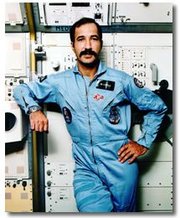Wubbo Ockels
|
|
Wubbo Ockels is a Dutch physicist and astronaut.
| Contents |
Personal data
Ockels was born March 28, 1946, in Almelo, The Netherlands, but considers Groningen, The Netherlands, to be his hometown. He is married with two children.
Education
Ockels received a doctor of philosophy degree in physics and mathematics from the University of Groningen in 1973. Completed a Ph.D. thesis on the basis of experimental work at the Nuclear Physics Accelerator Institute (K.V.I.) in Groningen in 1978. He is a member of the American Physical Society and the European Physical Society.
Experience
From 1973 to 1978, Dr. Ockels performed experimental investigations at the Nuclear Physics Accelerator Institute in Groningen. His work concerned the gamma-ray decay of nuclear systems directly after formation and the development of a data-handling system involving design of electronics and programming of real-time software. He also contributed to the design and construction of position-sensitive charged particle detectors. While at the K.V.I. Institute, Dr. Ockels supervised the practical work of first-year physics students at the University of Groningen.
In 1978, he was selected by the European Space Agency (ESA) as one of three European payload specialists to train for the Spacelab 1 mission. In May 1980, under agreement between ESA and NASA, Dr. Ockels was selected to begin the basic astronaut training for mission specialist together with the NASA astronaut candidates at NASA's Johnson Space Center, Houston, Texas. He successfully completed this training in August 1981. He rejoined the Spacelab 1 crew for training as a back-up payload specialist to operate experiments aboard Spacelab 1. This mission of a reusable, scientific research facility built by the European Space Agency (ESA) took place aboard the Space Shuttle in November 1983. Spacelab 1 was a joint NASA/ESA mission.
Space flight experience
Dr. Ockels flew as a payload specialist on the crew of STS-61A Challenger (October 30 to November 6, 1985). STS-61A was the West German D-1 Spacelab mission. It was the first to carry eight crew members, the largest to fly in space, and was also the first in which payload activities were controlled from outside the United States. More than 75 scientific experiments were completed in the areas of physiological sciences, materials science, biology, and navigation. At mission conclusion Dr. Ockels had traveled 2.5 million miles in 110 Earth orbits, and logged over 168 hours in space.
References
- Portions of this article are based on public domain text from NASA (http://www.jsc.nasa.gov/Bios/htmlbios/ockels-wj.html).de:Wubbo Ockels

